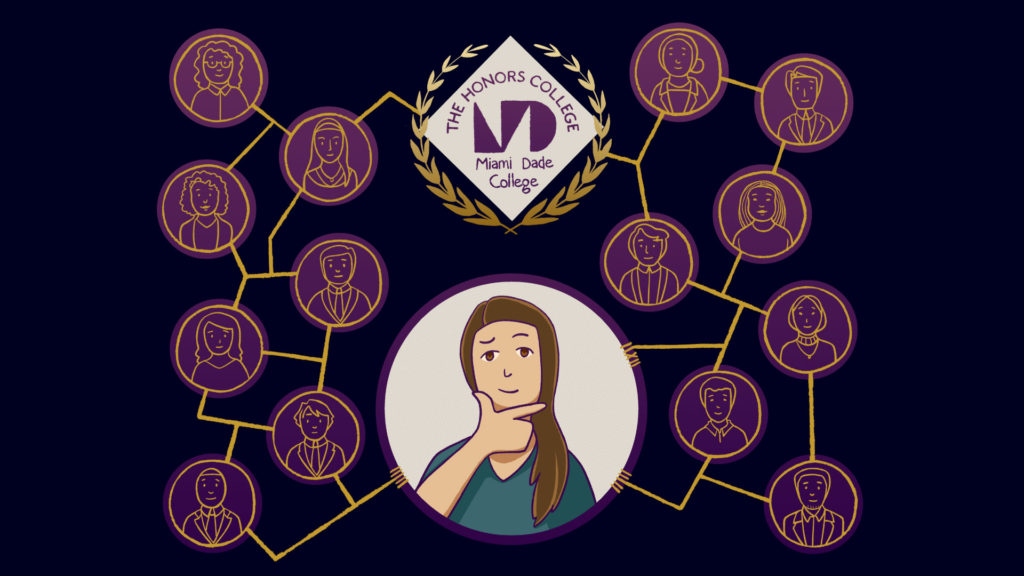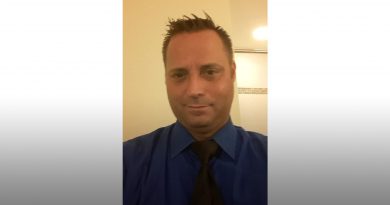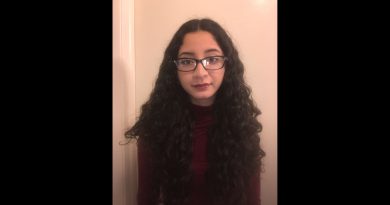Honors College Creates Alumni Advisory Committee
After graduating from the Honors College at Wolfson Campus in 2017, Kiana Vidal transferred to Cornell University to study communications and technology.
She said her new school was nothing like the close-knit community Vidal had grown accustomed to at Miami Dade College.
“It is a huge culture shock when you transfer,” Vidal said. “I just know if there would’ve been someone to turn to at the time it would’ve made the process a lot smoother.”
Looking to make the transfer process easier for others, she came up with the idea of launching an alumni network that supports Honors College graduates.
After a year of planning with Honors College Dean Eric Hoffman and Assistant to the Dean Marianne Maduro, the Honors College Alumni Advisory Committee was born. It consists of 15 Honors College alumni and two faculty members.
“They will be doing a lot that will not only help alums stay connected but also help students with their future endeavors,” Hoffman said. “I’m happy they are getting together and giving back to the Honors College and Miami Dade College.”
The Honors College has hubs at the Wolfson, Kendall, North and Padrón Campuses. It serves about 600 freshmen and sophomores through curriculums based on academic excellence, service-learning components and biweekly colloquiums.
Valentina d’Empaire, who graduated from the Padrón Campus Honors College in 2016, is eager to give back to the cohort that helped her transfer to Johns Hopkins University.
“The Honors College changed my life,” said d’Empaire, who serves as the committee’s vice chairperson. “I’m happy to be giving back to a place that gave me so much. That’s what we all want to do, to give back.”
Before creating the advisory committee, Hoffman and Maduro reached out to alumni they thought might be interested in helping. They created a questionnaire about their experience and desire to give back to the Honors College, time availability and areas of interest.
Alumni were chosen based on diversity—people from different backgrounds and viewpoints—professional success and availability.
The two faculty members in the committee are Michael Lenaghan, who teaches political science at North and Padrón Campus, and Wolfson Campus humanities professor Robert Henry. Their presence ensures that faculty stay connected with alumni and have a say in decisions.
“I hope to tackle opportunities to nurture, enhance, and advance most visionary, empowering and ethical opportunities generated by committee members,” said Lenaghan, who is the longest-tenured Honors College faculty.
The committee held its first meeting on Jan. 21 via Zoom. They plan to connect Honors College alumni to each other and to students through networking events, resume and transfer application workshops, mentorship programs and more.
Plans to improve the Honors College experience are already being designed. In the past months, they created four subcommittees with 2-7 volunteers each to lead new initiatives.
The fundraising committee will find ways to financially support students and fund events, the communications committee will design alumni outreach initiatives, the anniversary celebration committee will plan the Honors College’s 20th anniversary celebration next January, and the alumni mentoring network committee will create a program that matches students and alumni based on professional interests.
“It’s easy to talk to someone who has been through the same experience,” Vidal said. “They always are more willing to have that conversation and help in any way possible.”
Their second meeting will be held on April 13 to brainstorm more ideas for the subcommittees.
In the future, the committee hopes to create scholarships for students who are transferring so they can fund their bachelor’s degrees at other institutions. They also hope to create a website—or a subsection on the Honors College’s website—for alumni to get involved with the committee, make donations or stay updated about their plans.
The committee expects to meet four to five times a year. Each member will serve for two years and be re-elected for consecutive terms; members with executive leadership positions, like chair and vice chair, will be up for re-election annually.
“We are going to help students through a scary process [and] help them navigate [through it] and feel a little bit more comfortable,” said Vidal, the committee’s chairperson.



